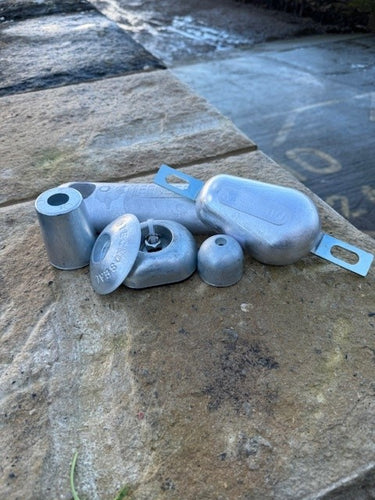
WHAT IS AN ANODE
WHAT IS AN ANODE
Demystifying Anodes: Understanding Their Importance in Corrosion Prevention
In the world of marine and industrial engineering, anodes play a crucial role in protecting metal structures from corrosion. Despite their significance, anodes often remain a mystery to many. In this blog post, we'll delve into the world of anodes, exploring what they are, how they work, and why they are essential for preserving the integrity of various structures.
What are Anodes? Anodes are sacrificial metal components strategically placed on structures that are susceptible to corrosion, such as ships, pipelines, offshore platforms, and storage tanks. They are typically made from metals like zinc, aluminum, or magnesium, which have a more active electrochemical potential than the material they are protecting.
How Do Anodes Work? To understand how anodes work, we need to grasp the concept of galvanic corrosion. Galvanic corrosion occurs when two dissimilar metals are in contact in the presence of an electrolyte, such as seawater or soil. In this electrochemical process, one metal acts as the anode (the less noble metal) and corrodes, while the other metal acts as the cathode and remains protected.
Anodes function by sacrificially corroding themselves instead of the protected metal structure. When an electrical circuit is formed between the anode and the structure it's protecting, the anode corrodes preferentially, releasing electrons in the process. This electron flow prevents the protected metal from corroding, thus extending its lifespan.
Types of Anodes: There are several types of anodes used in different applications:
-
Zinc Anodes: Commonly used in marine environments, zinc anodes are effective in protecting steel structures, ship hulls, propellers, and offshore platforms.
-
Aluminum Anodes: Lightweight and corrosion-resistant, aluminum anodes are favored for protecting underground pipelines and storage tanks.
-
Magnesium Anodes: Ideal for freshwater environments, magnesium anodes are used in tanks, heaters, and boat hulls.
The choice of anode depends on factors such as the type of structure, environmental conditions, and the material being protected.
Importance of Anodes: Anodes play a critical role in extending the lifespan of metal structures and reducing maintenance costs. By sacrificially corroding themselves, anodes prevent corrosion from spreading to vital components, ensuring the structural integrity and safety of installations in harsh environments.
Regular inspection and replacement of anodes are essential to maintain their effectiveness. Monitoring corrosion rates and ensuring proper installation of anodes are also crucial for maximizing their protective capabilities.
Anodes may be small in size, but their impact on corrosion prevention is monumental. Understanding the role of anodes in protecting metal structures is essential for engineers, maintenance professionals, and anyone involved in industries where corrosion poses a threat. By investing in quality anodes and implementing proper maintenance practices, we can safeguard critical infrastructure and prolong the life of valuable assets in diverse environments.
